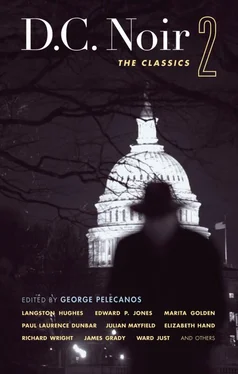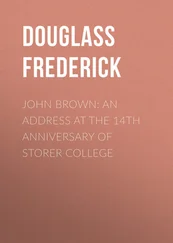“You okay?” Griffin asks as they walk slowly away from Jordan’s cruiser. Because this question seems the most puzzling inquiry he has ever heard in his life, Carson says nothing, although his gratitude for the question is immeasurable. Carson and Melvin Griffin walk away from the hive of activity immediately surrounding the crime scene, to a secluded space in front of the post office, Griffin’s arms fatherly, sheltering, on Carson’s shoulders.
“Obviously you were in fear for your life?” Griffin asks, standing at Carson’s side, not looking at him, but waiting, Carson knows, for the only answer he can give. The answer he will have to give.
“Yes,” he mumbles.
“You thought he had a gun.” Carson hears not a question but a statement.
“Yes.”
“Well, then this looks like a clean shooting to me,” Griffin concludes, casting his gaze back to the site they have just walked away from. “Take care of yourself and make sure you take your ten days. You call your wife?”
“Not yet.”
“Call her, son — it’s gonna be a long night.”
Griffin begins walking back toward the fire trucks and squad cars, the investigators, the officers from Internal Affairs who Carson knows want to talk to him, gently leading Carson back toward that assembly with him.
“No, no, can I just have a few minutes?” Carson asks.
“Take all the time you need,” Griffin tells him, and walks away, leaving Carson in the shadowy darkness outside the post office.
He feared for his life. He thought the man had a gun . If he had done the right thing, if he had done the only thing he could do, why did he now wish that he’d been rendered mute so that he could not speak, or blind so that he could not see what that fear and those thoughts had wrought?
No, he had not called Bunny. He wouldn’t. He couldn’t. He’d have to tell her this face-to-face.
“Be sure to take your ten days,” his sergeant had told him. Ten days before he had to make an official statement to anybody about what had happened, about what he had done. Ten days that would turn into weeks. Ten days to get his story straight? Ten days to keep silent, when all he really wants, even now, forty-five minutes after he has killed a young man holding a cell phone and not a gun, is to talk, to explain. But this is Maryland, and the state has legislated ten days of silence for a police officer after a shooting. Ten days to live alone in his own head, the last place he wants to be.
He can’t stay in the shadows forever, he knows, so Carson heads back to the others, still feeling the shadows engulfing him no matter how fast he tries to walk. He is still a police officer, and he has to bear witness to what has happened. To what he has done. He tells the story of the stop and the shooting to Margery Pierce, an investigator from the Criminal Investigation Division. She’s a red-haired, blue-eyed, frumpy matron Carson has seen at other major crime scenes like this one, and her hand rests on Carson’s shoulder as he leans against her van and talks to her, hearing his own voice as though from a great distance, as though it belongs to someone else. When Margery walks away, Lester Stovall from Internal Affairs steps toward Carson, asking first, like Margery, like everyone, if he is okay, and then before Carson can answer says, “Can you tell me what happened?”
Just as Carson is going to answer the question, Matthew Frey, the Fraternal Order of Police lawyer, walks out of the crowd surrounding the scene and puts his hand on Carson’s chest like a barrier between Lester and Carson and says to Lester, whom he knows and respects, “You know I get to talk to him first.”
Matthew Frey wears a wrinkled trench coat over a white shirt and khakis. He had hurriedly dressed in the bathroom of his Clinton, Maryland rambler after hanging up from the call from the president of the Fraternal Order of Police. Gently shaking his wife awake, he told her where he was going. He has defended police officers for eighteen years. In his office desk in Largo, he keeps a twenty-inch billy club that his grandfather used when he was on the force in Baltimore. Matthew Frey stands before Carson, trying to gather quickly how much he can handle, if he is an officer who will fall apart because of this night or one who will turn to stone. No matter how long he looks at Carson, he cannot tell for sure.
Carson sees Matthew Frey’s longish gray-white hair and his pencil-thin lips and reads in the man’s blue eyes that he is perhaps the only person present whose job is to protect him.
Frey walks with Carson to his Volvo, and they sit in the front seats.
“You smoke?” he asks Carson, offering him a cigarette.
“Naw.”
“Then I won’t. You called your family?”
“I can’t bring myself to do that just yet.”
“I understand. You okay?”
“Not really.” This is the first time Carson has answered the question. The first time he has spoken what he knows unalterably to be the truth.
“When you’re ready, I want you to tell me what happened. Take your time. Tell me everything just as it happened, as much as you can recall.”
Carson recounts the incident, filling the narrative with all the questions and the doubts that plague him, working through the silences that strangle him and hurtle him back into the moment with the retelling. “I know now that I should’ve waited for Jordan. He radioed he was on the way. It all happened so fast. So goddamned fast. I lost control. I mean, before I knew it he was reaching into his waistband and had turned around and was on his feet. On his feet, facing me. It couldn’t have been more than a few seconds before I lost control of the stop. That’s not supposed to happen, I know. But once he was on his feet, facing me, he was holding this object — he wouldn’t drop it like I kept telling him to. He kept trying to tell me something, but I wouldn’t listen, I couldn’t take the chance. He looked like a good kid. He gave me some lip, but he wasn’t at all what I was expecting. I was afraid for my life. I thought he had a gun.”
Frey listened, knowing that memory is fractured and heightened, made suspect by the lingering effects of trauma. Every time an officer tells him details of a shooting he’s been involved in, Frey recalls the conclusion of his favorite writer, Gabriel García Márquez, that life is not what one lives but what one remembers. Carson tells him much more than he needs to know. The days and weeks and months looming ahead of Carson will be even more crucial than this moment, as he helps him to remember the incident in ways that would render what happened inevitable rather than criminal. “You don’t have to make a statement when you go back to CID. Get one of the other officers to take you and I’ll meet you there. I’ll help you fill out the Discharge of Firearms report. You’ll be asked what happened. You’re not to say anything. Do you understand?”
“Yeah.”
“Have you ever fired your weapon before?”
“No.” Then Carson asks, “What’s gonna happen to me?”
“I don’t want you to worry about that tonight. I’ll protect your rights. Just know that.”
Carson has been in CID many times but never like this, with the eyes of the few officers in the building offering him so much compassion, never with those same officers stopping in the hall to pat him on the back, tell him he’ll be okay, to ask how he is.
In an office next to the area where roll call is held, Carson is asked by a Colin Barnes if he wants to make a statement. Barnes at two-thirty in the morning wears a cashmere jacket over a cream-colored shirt with a silk navy-blue tie and large silver cuff links, stylish as always amid the grimy gray funk, the stale, listless air, the battered furniture and indifferent decor that Carson knows too well and that weigh on him with an awful heaviness at this moment.
Читать дальше











